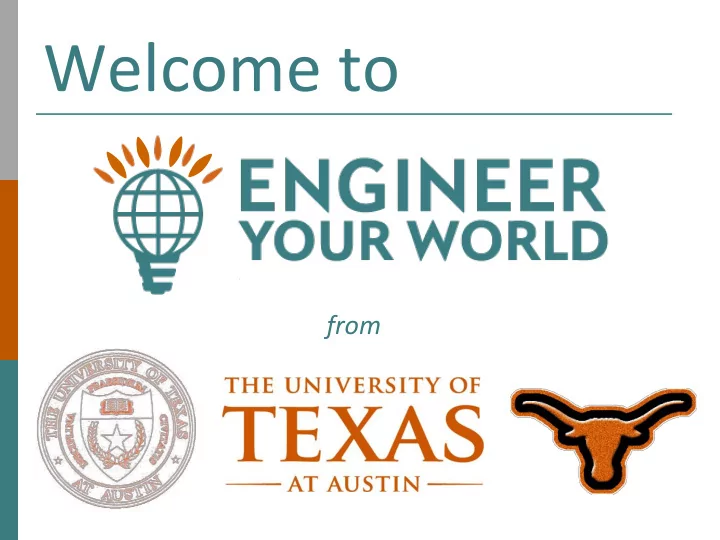

Welcome to from
You will learn how to think and create like an engineer This is a general engineering course. We will USE math and science to solve challenges. In this course you will • Learn what engineering is and how it impacts society ; • Learn how to design solutions to complex challenges using a process that is applicable to many subjects (not just engineering); and • Learn and practice engineering habits of mind .
You will complete a series of team-based challenges this year. Unit 4 Unit 5 Unit 2 Exploration Unit 1 Unit 3 Challenge Exploration Understanding Designing Overview & Designing for Challenge Data Norms Discovering Design with Data Customers (Chemical Engineering) (Multidisciplinary) (Civil Engineering) (Multidisciplinary) Unit 7 Unit 6 Exploration Unit 8 Challenge Programming Challenge (Electrical & Software Reverse Engineering Systems Engineering Engineering) (Mechanical Engineering) (Aerospace Engineering)
You will be graded both as teams and individually. 50% 50% Individual Team design work challenges
Teams will be graded on major group products. Everyone on a team gets the same score for: Final design quality Team documentation Team presentations
Individuals will be graded on notebooks and assessments. Notebooks Content assessments (quizzes, tests, homework) Peer assessments and self-assessments
The designers of this course are studying how well it works. We are part of a community of 77 Engineer Your World schools participating in research.
Yes! You are guinea pigs in an experiment!
Research Survey Complete the survey questions as best you can, regardless of whether you will consent to research. These surveys will be returned to the project researchers, but they will only look at the surveys of students who have consented.
What is Engineering? …and Who are Engineers?
What do you think of when you hear the word “engineer”? http://solutionists.ieee.org/
What do engineers do? Individually identify three areas of your life that engineers have affected that are not shown in the video. Put each idea on a separate post-it note. Share your three things with your group. Explain specifically (or give examples) of how engineers have affected these three areas of your life. (2 minutes) Each group will pick one item (area of life) from its collective list and explain how engineers have affected it.
What do engineers not do? With your group, identify at least three areas of life that engineers have NOT affected. (3 minutes) Each group will pick one area of life from your list and explain why the group thinks engineers have not affected it. All other groups will try to demonstrate how the area of life was, in fact, affected by engineers.
Engineers create solutions for people in a variety of fields.
Some mechanical and electrical engineers make new cars. Volvo car design for ease of access, storage, and comfort: www.media.volvocars.com
Civil Engineers make game changing products
Some engineers help “cure” paralysis.
Some engineers help “cure” paralysis. www.project-rewalk.com
Some engineers help “cure” paralysis. www.project-rewalk.com
What was the similar and what was different about the three engineering solutions offered to paralyzed humans? Ans. Kinds of engineering used. A.Mechanical B.Electromechanical C.Biomedical Types of technological fixes: A.Enhance existing technology B.Substituting/providing a proxy solution. C.Fixing what is broken.
Some chemical and mechanical engineers design chocolate factories.
What do you say to those who claim that advances in science and technology are taking away jobs from humans?
Does society value engineers? Average Starting Math & Sciences Salaries by Humanities & Soc. Sci. Field, 2013 Health Sciences Engineering Education Computer Science Communications Business $0 $20,000 $40,000 $60,000
Myth or Truth? Engineers are awkward, lonely introverts that work alone
Engineers excel in teams. “I am dependent on my team and my team is dependent on me to get the job done, regardless of whether it’s the proper execution of a football play or the completion of an engineering project.” Trevor, Civil Engineering student, UT football player
Engineers connect disciplines. She uses nanoparticles to make solar energy better and cheaper. -- Reeja, Materials Engineering student and Electrical Engineer
Engineers iterate, innovate, and create She is discovering how to create hydrogels for delivering drugs. Jordan, Chemical Engineering student
Engineers sell their ideas They are starting new businesses and meeting leaders in the field marketing their ideas through startups and business incubators .
NPR Podcast Planet Money – Nick Steinsberger, Inventor of Fracking http://www.npr.org/sections/money/ Minute: 6:00 Podcast: Oil #3: How Fracking Changed the World August 17, 2016 • Third of five episodes. The Planet Money oil faces a test, we sell it, and we meet the man who set off the fracking boom in America. STORY IN ATLANTIC MONTHLY: http://www.theatlantic.com/business/archive/2013/11/breakthrough- the-accidental-discovery-that-revolutionized-american-energy/281193/
Engineers Value Diversity More (and different) engineers = more ideas.
Engineers Value Diversity Students will share research on the value of diversity in many different fields.
Engineers Value Diversity The Blind Men and the Elephant
To Work Together, We Need Class Norms
Classroom norms are rules that we set for interacting with each other NORMS FOR POKEMON GO Look both ways before crossing Don’t trespass on private property in Texas You can’t be transgender for a day and go into the opposite sex bathroom to find Pikachu…
What Norms Should We Have? What norms do you want? (5 minutes) Think about the norms you would like us to observe. Using the provided pen and post-it notes, write one norm on each post-it note; turn these in. What norms do your classmates want? (10 minutes) Consider all of the suggestions. What trends do we see? What norms do we all want? (5 minutes) Let’s agree on the basic class norms that we will observe this year.
Homework Return completed Research Consent Forms Bring in something interesting and original (that no one else brings) that has been engineered. Be prepared to describe how you think it works in 2-3 minutes.
Recommend
More recommend